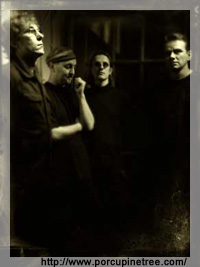|
Not so prickly
Steve Wilson of The Porcupine Tree tries to shake off the "prog rock" tag while explaining how the band works and the problems they have getting covered.
 One thing you don't want to do is tell Steve Wilson that his band are progressive revivalists. An articulate and talkative man, he has a quick and convincing answer for any accusation thrown at him. "Although we are interested in musicianship as much as we are in the songs, in England certainly, progressive is a very dirty word", he explains. One thing you don't want to do is tell Steve Wilson that his band are progressive revivalists. An articulate and talkative man, he has a quick and convincing answer for any accusation thrown at him. "Although we are interested in musicianship as much as we are in the songs, in England certainly, progressive is a very dirty word", he explains.
Fair enough, but he has gone on tour with Yes and Dream Theatre, not to mention the numerous comparisons to King Crimson and Tool in the press of late, perhaps invited by his move into more song-oriented territory.
"I don't think we sound like those bands, but we have a certain ideological spectrum that we all share. There is a section of people who like Yes who will like what we do. As for Porcupine Tree, I could quite easily make a living from doing it. I don't do the other stuff because I have to - I do it because I want to."
During the interview, Wilson comes across as a very realistic man, one who truly lives his music. He seems unapologetically pragmatic and instinctively understanding of where his music fits into society. This is rare in musicians of his calibre. He lacks the pretentious, overbearing attitude of most supposed progsters and is, as far as I can tell, a nice, friendly guy.
He's also very busy. Even with his solo project, NoMan, and various other side projects, including a song with OSI, featuring members of Fates Warning and Dream Theatre, he still writes, sings, plays guitar and produces most of Porcupine Tree's output, which amounts to seven studio albums in the last decade, not to mention various EPs, singles and a live album. How does he manage all this and keep the standard so high? Especially when other similar bands let years pass between new releases.
"I get very frustrated when I'm not doing anything. What do people do for the other six months? What they must do when they've finished touring an album is go and sit at home for six months."
"In Absentia", the Tree's new album, is ambitious and inspirational, with all manner of subtle atmospheric touches swirling around metallic guitars. Now, he fleshes out hypnotically complex songs on strong frames, contrasting with earlier psychedelic times when songs were almost invertebrate. This development is partly a bi-product of band members' experiments with other projects.
"Everyone in the band has other projects. I've always felt that was a healthy thing. I went and produced an album for Opeth and I definitely brought some of that back to the band."
 Wilson writes, sings, plays guitar and produces. He still enjoys the relationship dynamics of a band, the blending of different styles and attitudes into a single and unusually diverse whole. "When it comes to actually making the records, I guess I'm kind of the captain, but we're very much, you know, a band." Wilson writes, sings, plays guitar and produces. He still enjoys the relationship dynamics of a band, the blending of different styles and attitudes into a single and unusually diverse whole. "When it comes to actually making the records, I guess I'm kind of the captain, but we're very much, you know, a band."
Life for the Porcupine Tree has been somewhat of a battle. The press labelling game certainly hasn't helped. A quick listen to any of their albums after "Signify", or five minutes in Wilson's company, are enough to shake the tag for most. The British media has a short attention span and Porcupine Tree have been a victim of this.
"In England, there are only two or three publications with any real influence. In terms of TV exposure in England, 'Later with Jools Holland' is about it. It's really hard to get the media on your side now. It's all about image, about writing a great pop song, after all that great work that was done in the sixties and seventies about raising music to an art form."
Can we look on the bright side for a moment? Over the course of the last few albums, the band has certainly trimmed some of the musical fat that clogged the listener's ears on early, trippier efforts. It's more direct, and yet no less profound. Not a note goes wasted and no song outlasts its welcome by so much as one second. Creatively, the band has never been so vital or cutting-edge. Commercially things seem to be slowly improving too. Classic Rock has been raving about them, calling them "the best rock band in Britain" and recent forays into America have been surprisingly effective.
"We've had to build up our following by touring, playing with other bands and the Internet. The Internet has been absolutely invaluable to us. America's been much more supportive. They are much more open there. I think the reason that is the case in America is the proliferation of magazines and radio."
Porcupine Tree can get their music out in America. There are countless radio options open to them considering the sheer breadth of styles they cover. In England, their options are more limited and it frustrates the band to a certain extent. Wilson has no delusions of grandeur though. He's clearly prepared to put the work in and take any opportunities that come his way. How else can we explain the Yes connection?
With the incredible developments they've made in the last five years, it's hard to tell where Porcupine Tree can go next. Wilson clearly still has plenty of material. "I have a lot of animosity towards the music industry. I have a lot of animosity towards the human race. Who doesn't?" he offers.
So we shouldn't expect a pop record of Nickelback proportions then? "There are enough bands making pop records at the moment. To me music is always changing relative to your personality. One thing I can predict is that it will be different again."
And with that, I'm politely asked to move as the guy from FM104 is here. Porcupine Tree are playing the game, but playing it their way. Hopefully they can stay that step ahead.
Dominic Body
|

